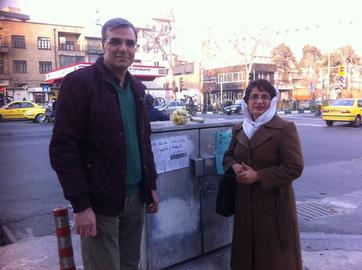Human rights lawyer Nasrin Sotoudeh’s husband gathered with lawyers and civil rights activists outside Evin Prison on Saturday, June 16 to protest against her arrest. Authorities arrested protesters and detained several of them for many hours.
Security forces arrested Sotoudeh a few days earlier outside her home, on Wednesday June 13.
“We had a tense and eventful day,” Sotoudeh’s husband Reza Khandan told IranWire. “Two of Nasrin’s colleagues with the power of attorney and I had planned to go to Evin courthouse. Sotoudeh has said that, in protest against the Article 48 amendment, she would refuse to have an attorney.”
According to a provision to Article 48 of Iran’s Code of Criminal Procedure added in 2015, in cases involving serious charges such as those carrying the death penalty or imprisonment for more than five years, during the pre-trial investigative phase defendants are only entitled to select attorneys that have been previously approved by the head of the judiciary. At the moment, there are only 20 “approved” attorneys.
According to Khandan, he and the other two lawyers hoped to access information about Nasrin Sotoudeh's case from the court. “In the past few days a number of friends did protest outside the prison, holding signs,” he says. “But today’s gathering was bigger than previous days.”
Demonstrators announced the event would take place beforehand, and on the day, they gathered outside Evin Prison’s main gate. “From the morning, they had deployed forces to scatter the protesters,” said Khandan. “At first they told people that they couldn’t stand there. So they went under the bridge much further away from the gate. But they suddenly attacked the gathering and dragged about 10 people inside a van while attacking them.”
Detained in a Hot Van
According to Khandan, security forces beat up protesters, including civil rights activists Davoud Farhadpour and Barbod Behravan. “They pulled Nasrin’s lawyers Arash Kaykhosravi and Payam Darafshan into the van. They left them in the van in intense heat.”
Plainclothesmen arrested Reza Khandan and the activist Lotfollah Meysami. “Dr. Meysami had brought collateral to post bail for Nasrin if necessary,” said Khandan. “They put us under arrest in another car. As a result of their assault, my hand was injured. We were there for about an hour. They took Kaykhosravi and Darafshan there before us and talked to them, but I couldn’t find out any details.”
Khandan reported that all detainees had been released, but that some of them were not in a good physical state. He was able to meet with Sotoudeh but says that, out of the 17 inmates from Women’s Ward who had visitors, only he and his was wife were forced to meet in a supervised cubicle.
He described Sotoudeh’s morale as “very good.” A day earlier, she was allowed to phone her husband. During the call, she told him her arrest was linked to the case against Shaparak Shajari, one of the “Revolution Women” who took off their scarves in public as a protest against forced hijab. Shajari was arrested in the city of Kashan.
“Secret” Charges against Sotoudeh
According to her husband, authorities did not specify the charges against Sotoudeh when presenting her case. “They gave her a file and told her she could read only up to a certain page because ‘the rest is secret.’” He added: “It is very ridiculous to tell the accused that the charges are secret.”
Sotoudeh protested against this treatment. “She told them,” Khandan said, “‘you are supposed to inform me of the charges against me. How can the charges be secret?’ Then they told her that the ‘general’ charges against her were that she had participated in an illegal gathering and propaganda against the regime. When Nasrin asked where she had committed these crimes, they answered: ‘in Kashan.’”
When she was in Kashan, Sotoudeh and the husband of her client Shaparak Shajari had gone to the courthouse. “The examining magistrate had committed many infractions,” Khandan said. “Nasrin had arguments with him and defended her client. Eventually they sent the case to Tehran but the magistrate filed a complaint against her. But legal cases and complaints from the magistrates and lawyers against each other are nothing out the ordinary. This is usually resolved through a summons to the court and a collateral [pay for bail]. There is no need for arrest.”
Just an Excuse
Four security agents arrested Nasrin Sotoudeh outside her home and took her to Evin Prison in a taxi. “I believe this complaint is just an excuse to stop Nasrin’s activities,” said Khandan. “And the Taxi Authority must also be held accountable because in several cases security agents used taxis for arrests.”
He said authorities had leveled the charge of “propaganda against the regime” against Sotoudeh in connection with her interviews with the media. “On the first day after her arrest they told Nasrin to post a bail of 650 million tomans [close to $153,000] so she would be released on bail,” Khandan said. ‘I have done nothing and I have neither [posted] such a collateral [amount] nor I would post it,’ she told them. When they told her to write down what she had said she refused. She was then told to write down her complaints, but she told them she was not going to put anything on paper. ‘I have done nothing,’ she said. ‘Either release me or put me in detention. I am here now and you can do with me whatever you want.’”
On June 17, Nasrin Sotoudeh was summoned to court, but she refused to go. “Under the law, when they send a summons,” her husband said, “they have to give the accused five days to prepare. But suddenly they tell the accused that she must go to court. They expect the accused to put her shoes on right there and then and go.” But Sotoudeh told authorities she demanded five days to prepare after receiving the summons.
Khandan reiterated that the only reason for Sotoudeh’s arrest was to stop her activities to defend the “Revolution Women” and other prisoners of conscious. She has also been an outspoken lawyer against the amendment to Article 48 of the Code of Criminal Procedure.
Nasrin Sotoudeh has a long history of arrests and imprisonment for her championship of human rights. In 2010, authorities sentenced her to six years in prison and banned her from practicing law on charges of propaganda against the regime and activities against national security. She was freed in September 2013 ahead of newly-elected President Hassan Rouhani’s visit to the United Nations.
In 2012, the European Parliament jointly awarded its most prestigious award, the Sakharov Prize for Freedom of Thought, to Sotoudeh and Iranian filmmaker Jafar Panahi.
In a statement on June 13, Amnesty International condemned Sotoudeh’s arrest as “an outrageous attack on a brave and prolific human rights defender.”
More on Nasrin Sotoudeh and her fight for human rights:
Nasrin Sotoudeh: “Preventive Arrest” is Illegal, January 8, 2018
Nasrin Sotoudeh: The Death Threats are “Getting Worse Every Day”, August 24, 2015
“The Security Forces are Trying to Ruin us Financially”, September 24, 2015
50 Iranian Women you Should Know: Nasrin Sotoudeh, September 9, 2015
Nasrin Sotoudeh and Supporters Defiant as Guards Break up Protest, February 2, 2015
Award-Winning Human Rights Lawyer Barred for Three Years, October 20, 2014
Nasrin Sotoudeh, My Lawyer, September 19, 2013

























comments